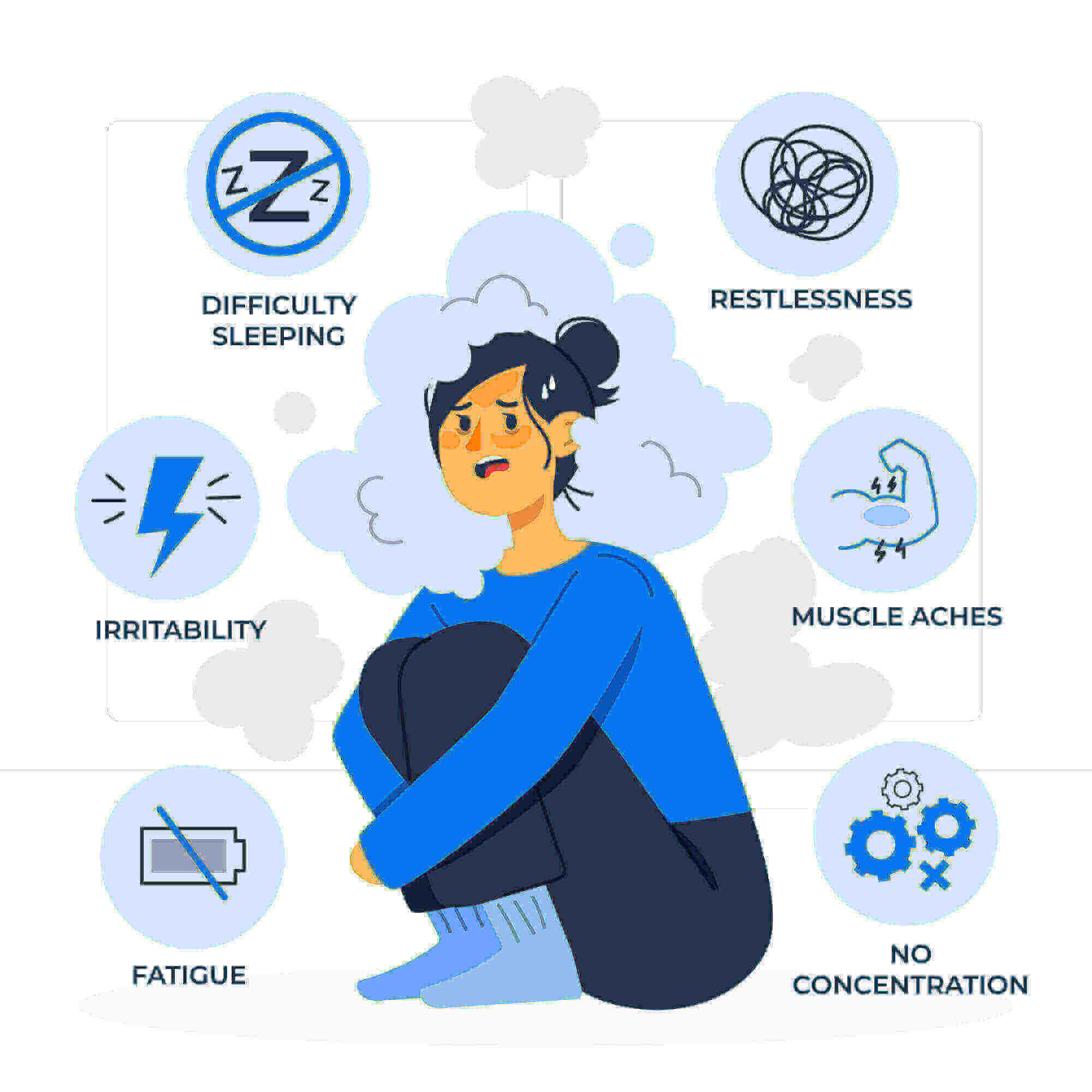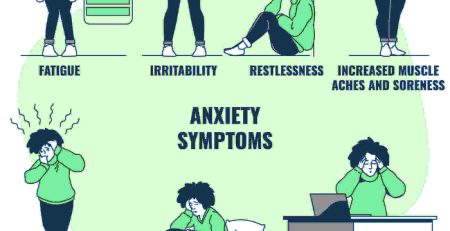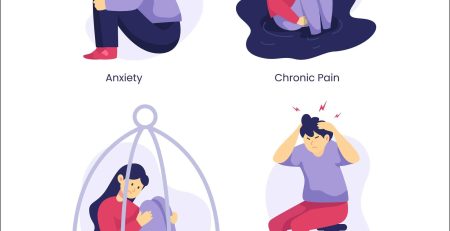Understanding Anxiety Symptoms And Their Impact
Mybestmentalhealth2023-12-08T20:01:25+00:00Are you constantly feeling on edge, struggling with racing thoughts, or experiencing physical symptoms like rapid heartbeat and shortness of breath? If so, you may be familiar with the overwhelming and often misunderstood world of anxiety symptoms. Don’t worry – you’re not alone.
In this article, we will delve into the various manifestations of anxiety and explore effective strategies for managing and alleviating these symptoms, providing you with the tools you need to regain control and find peace of mind. So, let’s embark on this journey together and discover a path towards a calmer, more fulfilling life.
2. Increased heart rate and rapid breathing.
3. Difficulty concentrating and making decisions.
4. Muscle tension and frequent headaches.
5. Fatigue and trouble sleeping.
By recognizing these signs, you can take steps toward managing anxiety and seeking appropriate support. Remember, everyone’s experience with anxiety may vary, so consult a healthcare professional for a proper diagnosis and treatment plan.
1. What are the most common symptoms of anxiety?
Anxiety can manifest in a variety of ways, and the symptoms can differ from person to person. However, some of the most common anxiety symptoms are below:
- Feeling restless or on edge
- Excessive worry or fear
- Racing thoughts
- Trouble concentrating
- Irritability
- Sleep disturbances, such as insomnia
- Physical symptoms are like rapid heartbeat, sweating, or trembling
- Stomach issues, such as nausea or diarrhea
If you experience these symptoms on a regular basis and they interfere with your daily life, it may be a sign of an anxiety disorder.
2. Can anxiety cause physical symptoms?
Yes, anxiety can cause a wide range of physical symptoms. When you’re anxious, your body goes into “fight-or-flight” mode, triggering the release of stress hormones like adrenaline. See below physical symptoms such as:
- Rapid heartbeat or palpitations
- Shortness of breath or feeling like you can’t catch your breath
- Chest pain or tightness
- Dizziness or lightheadedness
- Headaches
- Muscle tension or aches
- Upset stomach or digestive issues
- Excessive sweating
It’s important to note that while these symptoms can be distressing, they are generally not harmful and will subside once the anxiety is under control.
3. Can anxiety cause cognitive symptoms?
Yes, anxiety can cause cognitive symptoms that affect your thinking and mental processes. Some common cognitive anxiety symptoms are given below:
- Racing thoughts
- Difficulty concentrating or focusing
- Memory problems
- Excessive worry or rumination
- Negative thinking or anticipation of the worst
- Feeling on edge or constantly alert
- Difficulty making decisions
These cognitive symptoms can make it challenging to perform daily tasks, work, or engage in social activities. If you’re experiencing these symptoms, it’s important to seek support and treatment to manage your anxiety.
4. Can anxiety cause gastrointestinal symptoms?
Yes, anxiety can affect your gastrointestinal (GI) system and cause a range of symptoms. The gut is highly sensitive to stress and anxiety, and this connection is often referred to as the “brain-gut axis.” Some common GI symptoms associated with anxiety include:
- Nausea or stomach discomfort
- Diarrhea or loose stools
- Constipation
- Loss of appetite or increased appetite
- Abdominal pain or cramping
- Indigestion or heartburn
If you’re experiencing these symptoms, it’s essential to work with a healthcare professional to rule out any underlying medical conditions and develop a treatment plan to address both the anxiety and GI symptoms.
5. Can anxiety cause sleep problems?
Yes, anxiety can significantly impact your sleep and lead to various sleep problems. Some sleep issues commonly associated with anxiety include:
- Difficulty falling asleep
- Waking up frequently during the night
- Restless, fragmented sleep
- Waking up feeling tired or unrefreshed
- Insomnia
Anxiety can make it challenging to relax and quiet your mind, which can interfere with falling asleep or staying asleep. It’s important to establish healthy sleep habits and consider relaxation techniques or therapy to manage anxiety-related sleep problems.
6. Can anxiety cause heart palpitations?
Yes, anxiety can cause heart palpitations or the sensation of a racing or pounding heart. When you’re anxious, your body releases stress hormones that can increase your heart rate and blood pressure. This can lead to palpitations, which may feel like your heart is skipping a beat or beating too fast.
While heart palpitations can be unsettling, they are usually harmless and are a common symptom of anxiety. If you’re concerned about your heart palpitations or experience other concerning symptoms along with them, it’s advisable to consult your healthcare provider for a proper evaluation.
7. Can anxiety cause chest pain?
Yes, anxiety can cause chest pain or discomfort. When you’re anxious, your body can experience muscle tension and changes in breathing patterns, which can contribute to chest pain. It’s important to note that anxiety-related chest pain is typically sharp, fleeting and often felt on both sides of the chest.
However, if you’re experiencing severe or persistent chest pain, it’s crucial to seek immediate medical attention, as it could be a sign of a more serious condition.
8. Can anxiety cause shortness of breath?
Yes, anxiety can cause shortness of breath or the feeling of being unable to take a deep breath. When you’re anxious, your body’s stress response can cause rapid, shallow breathing, which can result in a sensation of not getting enough air.
It’s important to remember that anxiety-related shortness of breath is typically temporary and not life-threatening. However, if you have difficulty breathing or experience chest tightness along with shortness of breath, it’s crucial to seek medical attention to rule out any other underlying causes.
9. Can anxiety cause headaches?
Certainly! Indeed, for certain individuals, anxiety has the potential to induce tension headaches or migraines. When you’re anxious, your body can tense up, leading to muscle tension in the head, neck, and shoulders. This muscle tension can contribute to the development of headaches.
Additionally, anxiety can also exacerbate existing headache disorders, such as migraines. It’s essential to manage your anxiety levels and practice relaxation techniques to help prevent or reduce the frequency of anxiety-related headaches.
10. Can anxiety cause dizziness?
Yes, anxiety can cause dizziness or a feeling of lightheadedness. When you’re anxious, your body’s stress response can cause changes in blood flow and blood pressure, which can lead to dizziness.
Anxiety-related dizziness is usually short-lived and resolves on its own. However, if you experience severe or persistent dizziness, it’s important to consult with a healthcare professional to rule out any underlying medical conditions.
11. Can anxiety cause muscle tension or aches?
Yes, anxiety can cause muscle tension and aches throughout the body. When you’re anxious, your body’s stress response can lead to increased muscle tension as a result of the release of stress hormones like adrenaline.
This muscle tension can manifest as aches, pains, or tightness, commonly felt in the neck, shoulders, back, and jaw. Engaging in relaxation techniques, such as deep breathing exercises or progressive muscle relaxation, can help reduce muscle tension associated with anxiety.
12. Can anxiety cause excessive sweating?
Yes, anxiety can cause excessive sweating or hyperhidrosis. When you’re anxious, your body’s stress response can trigger an increase in sweating as a result of the release of stress hormones like adrenaline.
This excessive sweating can occur in various parts of the body, such as the palms, underarms, or feet. While it can be uncomfortable and embarrassing, managing anxiety through relaxation techniques, therapy, or medication can help reduce excessive sweating.
13. Can anxiety cause changes in appetite or weight?
Yes, anxiety can cause changes in appetite, leading to either increased or decreased food intake. When you’re anxious, your body’s stress response can affect your appetite and digestion.
Some individuals may experience a decrease in appetite and weight loss due to a loss of interest in food or feelings of nausea. On the other hand, some individuals may turn to food as a coping mechanism, leading to increased appetite and potential weight gain.
It’s important to maintain a balanced diet and establish healthy eating habits to support your overall well-being while managing anxiety symptoms.
14. Can anxiety cause tingling or numbness?
Yes, anxiety can cause tingling or numbness, commonly known as paresthesia. When you’re anxious, your body’s stress response can cause changes in blood flow and oxygen levels, which can lead to a sensation of tingling or numbness.
These sensations are usually temporary and subside once the anxiety diminishes. However, if you experience persistent or concerning tingling or numbness, it’s important to consult with a healthcare professional to rule out any underlying medical conditions.
15. Can anxiety cause hot flashes or chills?
Yes, anxiety can cause hot flashes or chills. When you’re anxious, your body’s stress response can lead to changes in body temperature regulation. Some individuals may experience sudden warmth or flushing of the skin (hot flashes), while others may feel cold or shiver (chills).
These sensations are typically temporary and resolve once the anxiety subsides. If you experience prolonged or severe hot flashes or chills, it’s advisable to consult with a healthcare professional to determine the underlying cause.
16. Can anxiety cause a feeling of impending doom?
Yes, anxiety can cause a feeling of impending doom or a sense that something bad is about to happen. This intense apprehension or fear is often associated with panic attacks or severe anxiety episodes.
If you experience a persistent feeling of impending doom or overwhelming anxiety, it’s important to seek support from a mental health professional. They can help you develop coping strategies and provide appropriate treatment to manage your anxiety.
17. Can anxiety cause a dry mouth?
Yes, anxiety can cause a dry mouth or xerostomia. When you’re anxious, your body’s stress response can lead to a decrease in saliva production as a result of changes in the autonomic nervous system.
A dry mouth can be uncomfortable and contribute to difficulties with swallowing, speaking, or tasting. Staying hydrated and using sugar-free lozenges or gum can help alleviate the symptoms of a dry mouth caused by anxiety.
18. Can anxiety cause urinary frequency or urgency?
Yes, anxiety can cause urinary frequency or urgency. When you’re anxious, your body’s stress response can lead to an increase in adrenaline, which can stimulate the bladder and result in a frequent need to urinate or a sense of urgency.
While anxiety-related urinary issues are usually temporary, it’s important to rule out any underlying medical conditions if you experience persistent or concerning symptoms. Seeking guidance from a healthcare professional can aid in identifying the underlying cause and finding a suitable course of treatment.
19. Can anxiety cause irritability?
Yes, anxiety can cause irritability or a short temper. When you’re anxious, your body is in a heightened state of arousal, which can make you more sensitive to external stimuli and result in irritability or a reduced tolerance for frustration.
Irritability is a commonly reported symptom of anxiety and can affect your relationships and overall well-being. Engaging in stress management techniques, such as deep breathing exercises or mindfulness, can help reduce irritability associated with anxiety.
20. Can anxiety cause a feeling of detachment or unreality?
Yes, anxiety can cause a feeling of detachment or unreality, often referred to as depersonalization or derealization. When you’re anxious, your body’s stress response can trigger changes in perception, leading to a sense of disconnection from oneself or the surrounding environment.
These feelings can be distressing and may contribute to a sense of unreality. If you experience persistent or severe depersonalization or derealization, it’s important to seek support from a mental health professional to address the underlying anxiety and develop coping strategies.
High-functioning anxiety: What are the signs and symptoms?
Conclusion
In conclusion, anxiety symptoms can manifest in various ways and have a significant impact on an individual’s daily life. The key symptoms of anxiety include excessive worry, restlessness, irritability, difficulty concentrating, and sleep disturbances. These symptoms can vary in intensity and duration, but when they persist and interfere with daily functioning, it may indicate an anxiety disorder.
It is important to recognize and understand anxiety symptoms to seek appropriate help and support. Anxiety disorders are highly treatable, and various interventions such as therapy, medication, and lifestyle changes can effectively manage symptoms. Additionally, self-care practices like regular exercise, relaxation techniques, and maintaining a healthy lifestyle can also contribute to reducing anxiety symptoms.
By identifying and acknowledging anxiety symptoms, individuals can take the necessary steps to manage their condition and improve their overall well-being. Seeking professional help is crucial for accurate diagnosis and developing a personalized treatment plan. With the right support and interventions, individuals can learn to cope with anxiety symptoms, regain control over their lives, and experience improved mental health.






Leave a Reply